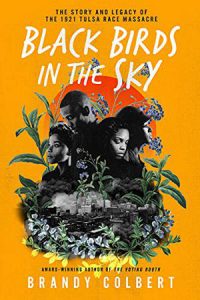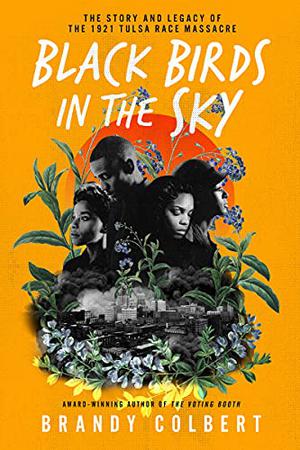 Brandy Colbert writes an important book, a story that needed to see the light of day. Black Birds in the Sky is a nonfiction account of the 1921 Tulsa Race Massacre. It is filled with sad and horrifying cruelty as it recounts one of the most deadly and destructive acts of racial violence in American History.
Brandy Colbert writes an important book, a story that needed to see the light of day. Black Birds in the Sky is a nonfiction account of the 1921 Tulsa Race Massacre. It is filled with sad and horrifying cruelty as it recounts one of the most deadly and destructive acts of racial violence in American History.
Colbert makes her readers aware of just how much the past inform the present. She enlightens us, explaining that history is full of progress and setbacks. The Unites States, in particular, has a violent genocidal foundation. Traumatic times often get passed over in classrooms and conversations because they make people uncomfortable. However, unless we acknowledge not only the victims of racial violence but also the shameful parts of our past, we risk repeating those sins and perpetuating racial injustice. Perhaps the words and wisdom of Ida B. Wells best capture this fact: “The way to right wrongs is to turn the light of truth upon them” (189).
In her book, Colbert introduces her subject by writing: “This history is painful. It makes me angry. It hurts to see just how many ways my life and my ancestors’ lives have been affected by white supremacy. But I am grateful for historians, social justice activists, and politicians who have made it their mission to ensure this history will no longer be buried” (10).
A country that lynches and disenfranchises its own citizens encourages ignorance. Furthermore, oppression and persecution contribute to violence since who among us would not resist such egregious mistreatment? Because of fear, jealousy, and ignorance, we often resort to violent acts of vengeance. Of these, Colbert claims that fear planted the seeds for the Greenwood massacre—fear of change, loss, and equality. After all, fear is a great motivator. Couple that with resentment, and you have the ingredients for a riot. “Because of segregation laws and personal choices, many white Tulsans never socialized or interacted with Black Tulsans. . . . This general ignorance of the lives and personalities of their Black neighbors left substantial room for spreading bigoted rumors and racial stereotypes” (115-116).
Despite the darkness of this historical narrative, readers will reap the rewards of valuable lessons. Among them are these: “We make America better when we aid our people” (176) and “Trauma is painful. It’s difficult to discuss, and often harder to make sense of. But pretending so-called unspeakable things simply didn’t happen is not the way to grow, to become better people or to make a better world” (202). Our progress depends on our telling of these stories because history matters.
Colbert questions whether history is bound to repeat itself because so many people don’t want to look to the past to see how we got to the future. She also asks: “How would people interact with one another if white Americans learned early on that they are not the center of every story, or that their stories are not the only ones that matter?” (203)
I agree that in the path forward, we need to ask more questions. Asking questions reminds us to continue seeking truth.
- Posted by Donna

